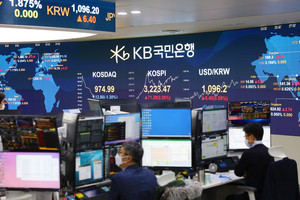[이코노믹리뷰=정다희 기자] As the volatility market continues, the fatigue of investors is increasing. Experts advise that there is a high possibility of a rebound in the second quarter after the stock market has finished taking a breather, and that a strategy to keep the road ahead is necessary.

According to the Korea Exchange on the 25th, the KOSPI index rose from 3180 points to 2993 points in the last 7 trading days. The index, which started sideways from last month, has been reacting sensitively to both bad news and good news this month and is fluctuating.
Recently, the coupling with the Chinese stock market is intensifying. Usually, our stock market has been largely influenced by the US. The Chinese stock market has become a barometer of emerging markets in Asia, and the inflow and outflow of foreign capital fluctuates greatly depending on the direction of the Chinese stock market.
The background of the sharp decline in the KOSPI index on the previous day was also largely affected by the decline in both China and Hong Kong stock markets due to the announcement of an increase in stamp duty on securities transactions in Hong Kong and concerns about liquidity absorption in China. On this day, the Hang Seng Index of Hong Kong closed at 22,969, down 3.07% from the previous trading day. China’s Shanghai Composite Index also closed at 3642.445, down 1.45% over the same period.
The KOSPI index also responded sensitively. The KOSPI fell 2.45% from the previous trading day, breaking the 3000 line. Considering that Hong Kong’s announcement of an increase in stamp duty on securities transactions is not a factor that directly affects the Korean stock market, there are opinions that the decline was too large.
NH Investment & Securities researcher Kim Young-hwan said, “The main factors that caused the stock price to decline the previous day were due to the news of the Hong Kong government’s stock exchange tax hike and concerns about the recovery of liquidity from the People’s Bank of China.” It was great,” he explained.
Recently, some of the Democratic Party of the United States has also heard voices about the introduction of the financial transaction tax, and it is analyzed that it was accepted by foreigners as concerns that the increase in Hong Kong could be a sign of a global asset market increase.
Researcher Kim said, “The increase in financial transaction tax is a means to curb asset inflation and provide financial stimulus for economic stimulus. He pointed out, “I only secured a small amount of tax revenue.” As the tax effect is low, the possibility of the introduction of financial transaction tax is low.
“We need to prepare for a rebound in the stock market in the second quarter”… Strategies are effective
The financial investment industry is responding sensitively to various favorable and negative events as the Korean stock market moves sideways, but it is expected to rise again in the second quarter. The recent concerns over interest rate hikes in the stock market are highly likely to be resolved after the base effect disappears, and exports are improving as a factor that can expect future earnings momentum.
Kim Joong-won, head of the investment strategy team at Hyundai Motor Securities, said, “KOSPI is expected to rebound from March.” “After the 2008 financial crisis, the surge in oil prices caused by the base effect led to inflation pressure, which led to a rise in long-term government bond interest rates,” said Kim. “After the base effect disappeared, interest rates declined again as inflation pressure weakened.” Explained.
Nevertheless, he predicted that if interest rates do not stop rising, the Fed is likely to go directly. “If interest rates continue to rebound due to cost inflation concerns, this will act as a big variable in the Fed’s economic recovery scenario.” “The Fed will have to act in any way, including verbal intervention and increased bond purchases.” did. It is an analysis that liquidity is unlikely to shrink in a short period of time.
KB Securities Investment Consulting Manager Im Sang-guk said, “Although the index is taking a breather after the surge, the uptrend will continue again thanks to economic recovery, earnings improvement, and liquidity.”
In addition, he emphasized, “It is important to take a selective approach to large-cap stocks that are expected to recover in earnings amid the volatility market and small- and mid-cap stocks equipped with issue-themed materials. It is time to keep the path.” Keeping track of the road is a strategy to preoccupy the sectors and stocks that are expected to increase in the next cycle.
Accordingly, the core themes were carbon-neutral-related projects in accordance with the eco-friendly policies of each country, the development of new industries such as 5G, bio, and semiconductors, and the advancement of mobility of IT companies. Specific items include Lotte Chemical (011170), CS Wind (112610), Naver (035420), Kakao (035730), LG Electronics (066570), Nextin (348210), Incross (216050), Samsung SDI (006400), Hyundai Motor Company (005380) and Dong-A Hwaseong (041930) were selected.
